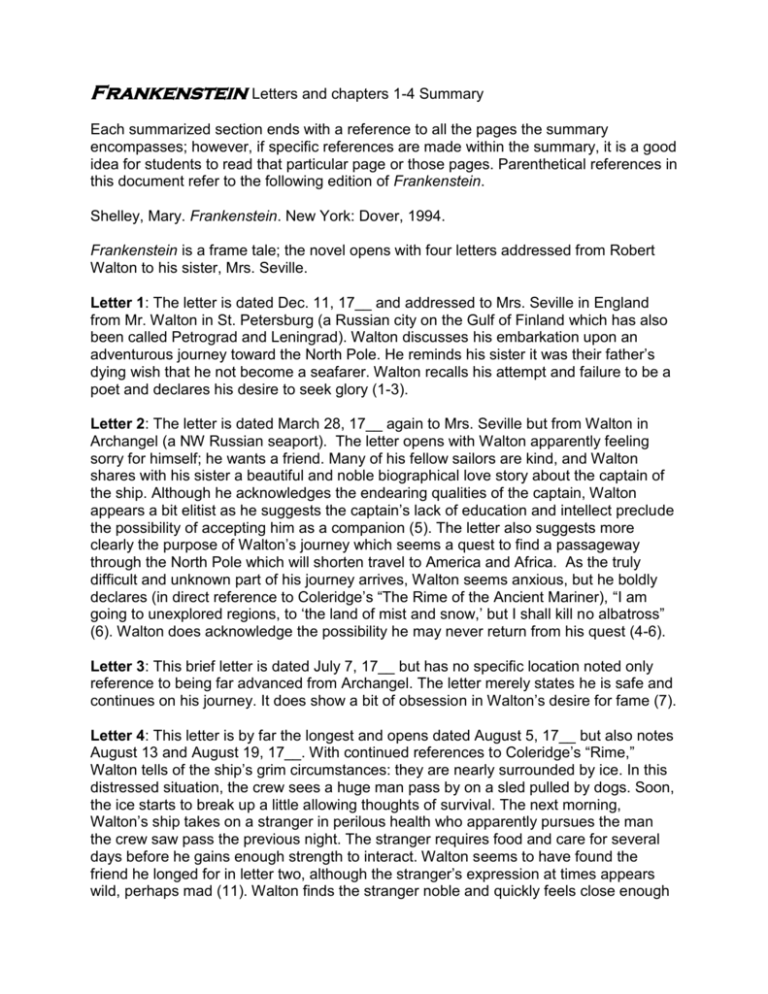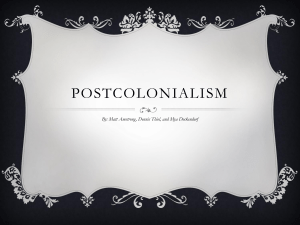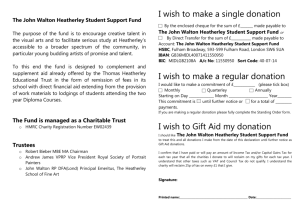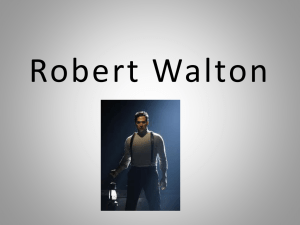Frankenstein Letters and chapters 1-4 Summary
advertisement

Frankenstein Letters and chapters 1-4 Summary Each summarized section ends with a reference to all the pages the summary encompasses; however, if specific references are made within the summary, it is a good idea for students to read that particular page or those pages. Parenthetical references in this document refer to the following edition of Frankenstein. Shelley, Mary. Frankenstein. New York: Dover, 1994. Frankenstein is a frame tale; the novel opens with four letters addressed from Robert Walton to his sister, Mrs. Seville. Letter 1: The letter is dated Dec. 11, 17__ and addressed to Mrs. Seville in England from Mr. Walton in St. Petersburg (a Russian city on the Gulf of Finland which has also been called Petrograd and Leningrad). Walton discusses his embarkation upon an adventurous journey toward the North Pole. He reminds his sister it was their father’s dying wish that he not become a seafarer. Walton recalls his attempt and failure to be a poet and declares his desire to seek glory (1-3). Letter 2: The letter is dated March 28, 17__ again to Mrs. Seville but from Walton in Archangel (a NW Russian seaport). The letter opens with Walton apparently feeling sorry for himself; he wants a friend. Many of his fellow sailors are kind, and Walton shares with his sister a beautiful and noble biographical love story about the captain of the ship. Although he acknowledges the endearing qualities of the captain, Walton appears a bit elitist as he suggests the captain’s lack of education and intellect preclude the possibility of accepting him as a companion (5). The letter also suggests more clearly the purpose of Walton’s journey which seems a quest to find a passageway through the North Pole which will shorten travel to America and Africa. As the truly difficult and unknown part of his journey arrives, Walton seems anxious, but he boldly declares (in direct reference to Coleridge’s “The Rime of the Ancient Mariner), “I am going to unexplored regions, to ‘the land of mist and snow,’ but I shall kill no albatross” (6). Walton does acknowledge the possibility he may never return from his quest (4-6). Letter 3: This brief letter is dated July 7, 17__ but has no specific location noted only reference to being far advanced from Archangel. The letter merely states he is safe and continues on his journey. It does show a bit of obsession in Walton’s desire for fame (7). Letter 4: This letter is by far the longest and opens dated August 5, 17__ but also notes August 13 and August 19, 17__. With continued references to Coleridge’s “Rime,” Walton tells of the ship’s grim circumstances: they are nearly surrounded by ice. In this distressed situation, the crew sees a huge man pass by on a sled pulled by dogs. Soon, the ice starts to break up a little allowing thoughts of survival. The next morning, Walton’s ship takes on a stranger in perilous health who apparently pursues the man the crew saw pass the previous night. The stranger requires food and care for several days before he gains enough strength to interact. Walton seems to have found the friend he longed for in letter two, although the stranger’s expression at times appears wild, perhaps mad (11). Walton finds the stranger noble and quickly feels close enough to him to confess his willingness to sacrifice everything for his ambitions. The stranger warns Walton not to share the stranger’s madness. The stranger suggests Walton has his whole life ahead of him while the stranger (Victor Frankenstein) has lost everything and cannot begin again. Eventually, Walton gains Frankenstein’s good favor, and Frankenstein agrees to share his story with Walton. Frankenstein begins commenting on his fate which he says is “almost fulfilled” and laments the fact that “nothing can alter [his] destiny? (13). Frankenstein also states one more event must happen in order for him to rest in peace. Before he begins his story, Frankenstein warns Walton that it is both horrific and unbelievable (8-14). Chapter 1: Frankenstein narrates his family’s background and tells the noble story of Beaufort (his father’s friend) which reminds the reader of the captain’s story presented in Letter 2. Frankenstein describes his parents’ courtship and (somewhat alarmingly!) tells that they viewed him, their first child, as an “idol” and “plaything” (16). Frankenstein also discusses the obligation his parents felt to him, their child: “with this deep consciousness of what they owed towards the being to which they had given life. . ..” (This becomes very important later in the novel when readers see how Frankenstein treats his creation). Like Walton, Frankenstein presents himself (and his family) as somewhat elitist (17). He also discusses his family’s compassion toward the poor and shares that they eventually “adopted” a girl, Elizabeth. In a disturbing moment, Frankenstein’s mother suggests Elizabeth is a “present” for Victor, and Victor seems to view her as a possession. At the end of this chapter, readers find the following passage: “no word, no expression could body forth the kind of relation in which she stood to me— my more than sister, since till death she was to be mine only” (18). This passage presents important foreshadowing (14-18) Chapter 2: The chapter conveys how Elizabeth and Victor grow up together but remain diverse. Elizabeth is calm but Victor intense. She likes poetry and nature; he leans toward the sciences (This sets up the conflict in the novel between Romantic thought and neo-Classicism or Age of Reason thinking). Henry Clerval, Victor’s closest friend is also introduced in this chapter. Clerval loves to read and write tales of chivalry, King Arthur, etc. Victor conveys that his childhood could not have been happier. He feels fortunate. Frankenstein’s interest in science leads to a desire to learn the secrets of heaven and earth. Elizabeth seems to embody gentleness and keeps Frankenstein grounded. Occasionally stepping out of the narration, Frankenstein apologizes to Walton (remember Frankenstein is on a ship telling Walton his tale) for the lengthy exposition assuring him the background is necessary for the complete understanding of his miserable story. Frankenstein (F) also suggests he possesses an ignoble nature. Frankenstein compares himself to Sir. Isaac Newton—they both search for truth! F suggests his father was unscientific and of little help. In this chapter readers see suggestions that F resists accepting responsibility for his own actions. F decides he must pursue science and glory and decides wealth is of limited importance (Shelley alludes to Letter 1). F references a terrible thunderstorm he witnessed as a child and the complete destruction of a tree struck by lightening (22). His witness of this changes his ideas, and Frankenstein forgets about natural history and studies math and other branches of science. Much foreshadowing occurs near the end of the chapter as Frankenstein now realizes (while sharing his story with Walton) his destiny was too powerful for good. He decided to pursue the field that would give him much grief and cause much destruction. “It was a strong effort of the spirit of good, but it was ineffectual. Destiny was too potent, and her immutable laws had decreed my utter and terrible destruction” (23) concludes the chapter (18-23). Chapter 3: At age 17, F prepares to go to the University of Ingolstadt but delays because Elizabeth comes down with scarlet fever. F calls this his “first misfortune” and labels the incident “an omen . . . of my future misery (23). Elizabeth recovers, but F’s mother who refused to avoid and instead cared for the ailing Elizabeth becomes ill. Her dying wish is for F and Elizabeth marry, and Elizabeth to act as a mother figure to her younger children, F’s brothers, Ernest and William. While the family mourns, Elizabeth acts as a comforter to all. When it is finally decided that F may continue in his plans to go to school, his friend Henry wishes to accompany him, but Henry’s father narrowmindedly refuses. When F first leaves, he feels melancholy and alone, but his spirits are raised as he remembers his desire for knowledge. Two professors become an influence in his life: Prof. Krempe is appalled that F. wasted his time studying outdated concepts and ideas and suggests he forget everything and start over. Prof. Waldman is more positive and sparks F’s interest in chemistry. F decides to become a pioneer—to unfold the deepest mysteries of creation. Waldman, who seems positive of F’s future success, advises him to study every branch of natural philosophy and math. At the end of the chapter, F claims that the day he first heard Waldman speak “decided [his] future destiny” (29) in another reference to F’s fate (23-29). Chapter 4: Eventually, F’s sole occupation is natural philosophy, especially chemistry— he works late at night and often through the morning in his lab. He is very involved in his studies; he does not visit his home. He feels science is different than other fields of study. Within two years F makes some discoveries that improve some chemical instruments, and he finds esteem at the university. He considers going home but changes his mind. F begins a fascination with endued life and how life proceeds. He studies anatomy and natural decay and considers the supernatural. He succeeds in discovering the cause of generation and life and becomes capable of animating lifeless matter. F refuses to tell the secret to Walton (remember F is on Walton’s ship telling his story) and warns Walton of the danger of knowledge. F shares that he found difficulty in deciding how to employ his knowledge, but his imagination was too exalted to begin with an organism or a small creature. He feels creation will bless him. As he tells Walton his story, F trembles at the thought of this time now because he feels he has lost his soul. When absorbed in his study and project, F neglects the outside world (nature) and his friends and family. In reflection, F discusses what he feels a perfect person should always preserve a calm and peaceful mind and never allow passion or desire to disturb his tranquility. F suggests that if the world followed this advice, “Greece” would not have “been enslaved, Caesar would have spared his country, America would have been discovered more gradually, and the empires of Mexico and Peru [would not have] been destroyed” (34). Still, F feels his creation is the only way he can quell his anxiety and continue—his success will cure all (29-34).






